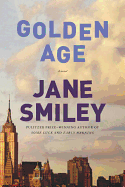
In the final book of her Last Hundred Years trilogy, Jane Smiley's Langdon clan enters the future, with few descendants of Walter and Rosanna left on the Iowa farm where it began in 1920, in Some Luck. The prosperity of the Boomer generation in Early Warning played out mainly on the East Coast, but as the Langdons multiply, they disperse nationwide.
The two-page family tree is handy, as the heirs extend to great-great grandchildren. Golden Age can stand alone, but readers of the series' first two books will enjoy the characters' development, and mourn those who die. Joe, the Langdon farmer, deals with government subsidies, Monsanto's promises and drought. Richie, one of Frank and Andy's twins, is a congressman from Brooklyn (he's in office on 9/11); his brother Michael is an unscrupulous financier. Women move from the postwar housewife role into careers, and it's Joe's daughter Felicity who harbors a love for the land, taking a scientific approach instead of her dad's intuitive one. Andy is surprisingly savvy in her widowhood, and an illegitimate Langdon, born in the Vietnam era, adds an intriguing subplot.
Rural meth labs, "the energy infrastructure," agribusiness, land foreclosure: as 2019 ends the world seems doomed. But Claire reflects on what makes a "golden age" and evokes simple Midwestern roots: "No one would ever know that her father, Carl, the endless Iowa horizon, a pan of shortbread emerging from the oven, and her grandchildren laughing in the next room had indeed made her life a golden age." --Cheryl Krocker McKeon, manager, Book Passage, San Francisco

